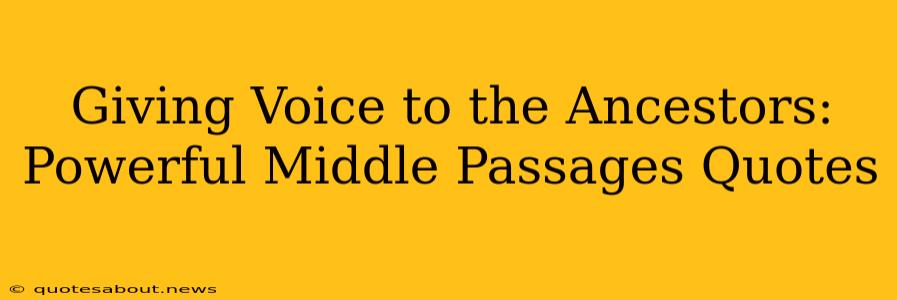The Middle Passage, the transatlantic voyage that forcibly transported millions of Africans to the Americas, remains a searing scar on human history. While the horrors experienced during this brutal journey are largely undocumented due to the silencing of enslaved voices, fragmented accounts, oral histories, and interpretations of surviving artifacts offer glimpses into the unimaginable suffering endured. Examining powerful quotes related to the Middle Passage, even those extracted from later accounts, allows us to amplify the silenced voices and better understand the enduring impact of this tragic era. These quotes, while sometimes indirect, provide crucial insights into the resilience, resistance, and profound loss experienced by those who survived.
What were the conditions like during the Middle Passage?
The conditions aboard the ships during the Middle Passage were horrific beyond comprehension. Overcrowding was rampant, leading to disease, starvation, and death. Enslaved Africans were chained together in cramped spaces with minimal access to food, water, or sanitation. The lack of hygiene resulted in widespread outbreaks of diseases like dysentery, smallpox, and scurvy, further decimating the already vulnerable population. Many died before even reaching the shores of the Americas.
What were some common forms of resistance during the Middle Passage?
Despite the overwhelming oppression, enslaved Africans displayed remarkable resilience and employed various forms of resistance. These ranged from subtle acts of defiance like feigning illness or slowing down work to more overt actions such as revolts and attempts to sabotage the ships. While these acts often came at great personal risk, they demonstrated a powerful refusal to surrender to their captors and represent a vital aspect of the enslaved Africans' fight for survival and dignity. The lack of detailed records makes it difficult to fully document all forms of resistance, but historical accounts and oral traditions provide glimpses into these courageous acts.
How did the Middle Passage impact African culture and identity?
The Middle Passage inflicted immense trauma, leading to the disruption of families, communities, and cultural practices. The forced removal from their homelands and the brutal conditions of the voyage resulted in a profound loss of identity and cultural continuity for many. However, despite these setbacks, Africans found ways to maintain aspects of their culture and traditions, albeit often in modified or adapted forms. Music, storytelling, and religious practices played crucial roles in preserving cultural memory and offering solace in the face of suffering. The impact on African culture and identity remains complex and continues to be explored by scholars today.
What is the significance of remembering the Middle Passage?
Remembering the Middle Passage is paramount to understanding the lasting effects of slavery and its enduring legacy on societies around the world. By acknowledging this brutal history, we can confront the systemic racism and inequality that continue to plague us. The stories of those who survived—their resilience, their resistance, and their enduring spirit—serve as a powerful testament to the human capacity for survival and the importance of fighting for justice and equality. It is crucial to remember the Middle Passage not merely as a historical event but as a foundational element in the ongoing struggle for social justice and racial equity.
How can we ensure that the voices of those who experienced the Middle Passage are heard?
Ensuring that the voices of those who experienced the Middle Passage are heard requires a multi-faceted approach. This includes:
- Supporting historical research: Continued research into primary sources, oral histories, and archaeological evidence can help illuminate the experiences of those who endured the journey.
- Promoting educational initiatives: Incorporating accurate and comprehensive accounts of the Middle Passage into educational curricula is vital for raising awareness and fostering empathy.
- Preserving cultural heritage: Efforts to preserve and celebrate the cultural traditions that survived the Middle Passage are crucial for honoring the resilience of African peoples.
- Creating platforms for storytelling: Providing platforms for descendants of those who suffered during the Middle Passage to share their stories can help ensure that their voices are heard and their experiences are acknowledged.
By actively engaging in these efforts, we can work towards a more just and equitable future built upon a foundation of truth and reconciliation. The stories of the Middle Passage are not just about the past; they are essential for understanding the present and shaping a better future.

